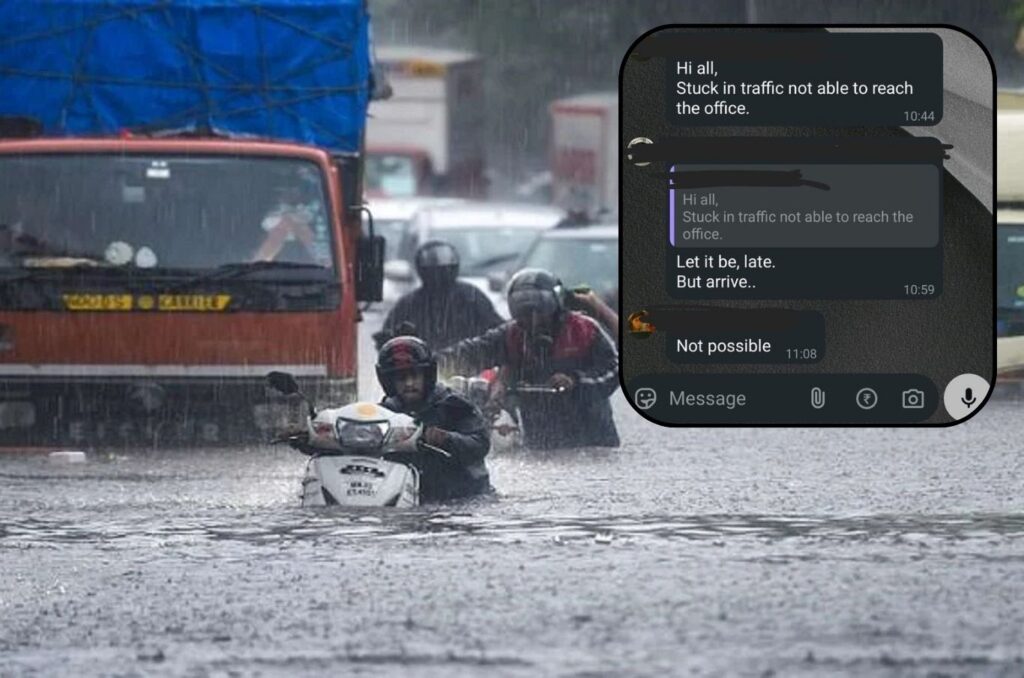Mumbai rains are legendary. Every monsoon season, the city witnesses heavy downpours that bring life to a grinding halt. Trains get delayed, roads get waterlogged, and office-goers are left struggling to commute. Amidst this yearly chaos, a new viral story is making waves online — an employee’s savage reply to a boss who refused work-from-home (WFH) during the rains. The incident has not only struck a chord with thousands but has also sparked debates on social media about work culture in India.
Mumbai Rains: The Eternal Struggle
Every year, the monsoon in Mumbai is both a blessing and a curse. While the rains bring relief from the heat, they also cause flooded streets, traffic jams, and disrupted train services. For office workers, reaching their workplace often feels like an adventure. Employers, however, are notorious for pushing employees to report to office despite the chaos.
This year too, the situation repeated itself — but one employee’s witty comeback has taken the internet by storm.
The Boss’s Refusal
According to viral screenshots circulating on Twitter and WhatsApp groups, an employee requested to work from home due to severe waterlogging in their area. The boss, however, bluntly refused, insisting that “everyone should report to office” as work-from-home was “not an option.”
The tone of the message reflected the typical rigid corporate culture where employee safety often takes a back seat.
The Employee’s Savage Reply
Instead of silently accepting the order, the employee shot back with a savage yet logical reply. The message read something along the lines of:
“If you want me to swim to office in chest-deep water, please confirm if the company will reimburse a lifeboat or at least provide scuba diving gear. Otherwise, I will log in from home and keep myself safe.”
The witty comeback perfectly captured the frustration of Mumbai’s workforce while also highlighting the absurdity of employers who ignore ground realities.
Social Media Explodes
As soon as the exchange was shared online, it went viral across Twitter, Instagram, and LinkedIn.
-
Many users hailed the employee as a “real hero” for speaking up.
-
Memes flooded the internet with captions like “Mumbai rains + Indian bosses = disaster combo”.
-
Some even suggested the employee deserved a promotion just for the creativity of the reply.
The viral post has since been shared thousands of times, making it one of the most talked-about “Mumbai rain” moments of this season.
Debate on Work Culture
Beyond the humour, the incident has triggered an important debate about corporate work culture in India.
-
Should employees be forced to risk their lives just to attend office during extreme weather?
-
Why are some companies still reluctant to allow WFH when technology makes it completely possible?
-
Isn’t employee safety supposed to be a top priority?
Several professionals shared their own experiences of being asked to come to office during floods, cyclones, and other emergencies, pointing out how little empathy some employers show.
Why This Story Resonates
The viral nature of this incident is not just about the humour. It resonates with millions of Indians because:
-
Everyone has faced similar situations — stuck in floods, delayed trains, or long commutes.
-
It reflects the mismatch between employees and employers in terms of priorities.
-
It speaks to a larger shift in mindset — post-pandemic, employees expect flexibility and safety, while some companies still cling to rigid old systems.
Conclusion
The Mumbai rains will continue to drench the city every year, but this season has given us a story that combines humour, frustration, and a much-needed reality check for employers. The employee’s savage reply has not only made people laugh but has also opened up discussions about how workplaces need to evolve.

